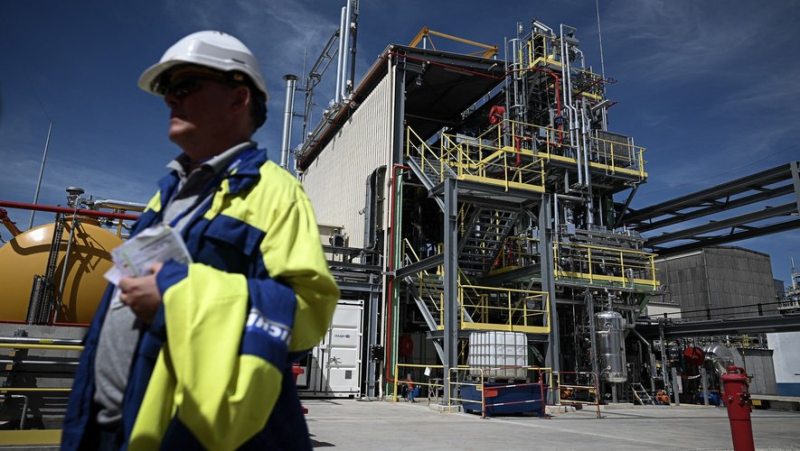The new strategy of Michelin stores to attract new customers is betting on rice

On its Bassens industrial site, Michelin inaugurated an industrial demonstrator in mid-January allowing manufacturing with biosourced ethanol. Philippe LOPEZ/AFP
Recycling yogurt pots will have to wait. To succeed in manufacturing "green" without petroleum products, its objective by 2050, Michelin has decided to invest first in green chemistry and biosourced synthetic rubber, putting its project to recycle polystyrene from yogurt pots.
In its Bassens factory near Bordeaux where the tire giant produces synthetic rubber from hydrocarbon derivatives, Michelin inaugurated in mid-January an industrial demonstrator presented as the first in the world allowing it to work from hydrocarbon derivatives. #39;biosourced ethanol.
A tangle of pipes connecting a large yellow tank filled with ethanol to three reactors and several distillation columns, it will be able to produce 25 tonnes of biosourced butadiene per year.
Ethanol comes from agricultural waste (corn, beets) or wood biomass. Michelin also plans to obtain it via industrial CO2 capture in the future.
As in a petrochemical steam cracker, the carbon, hydrogen and oxygen molecules of ethanol (chemical formula C2H6O) recompose under pressure to form butadiene (C4H6), the ;#39;researched item.
Equipped with more than 700 measurement sensors, the equipment must above all make it possible to prepare for the move to group scale.
That is to say the construction by 2030 of a factory capable of producing 100,000 tonnes of biosourced butadiene per year.
"Renewable or recycled"
The objective of the equipment manufacturer for its future "green tire" is to "achieve 100% materials of renewable or recycled origin in 2050", recalls the director of research and development, Eric Vinesse.
The group has already approved a tire made from 45% sustainable materials, which should inspire its new ranges from 2025.
But the industrial revolution is only just beginning: for the moment, Michelin has only reached "30%& ;quot; of its objective on its marketed tires, mainly thanks to the use of hevea (natural rubber).
The remaining 70% is composed of around 200 molecules, the origin or manufacturing of which must be changed to green them, by combining green chemistry and the circular economy.< /p>
In this strategy, the group had for three years bet at the same time on another project, after taking a minority stake in 2020 in a Canadian start-up for the chemical recycling of polystyrene by microwave, Pyrowave.
Its objective is to build a polystyrene recycling plant to be able to integrate recycled material into its tires, composed on average of 11% styrene, the basic element of polystyrene, and 14% butadiene.
But the project, eagerly awaited by manufacturers of yogurt pots and cosmetic packaging, large consumers of polystyrene, was put on hold.
The styrene project "remains a pivotal project for us" a research manager told AFP, "but the context of the polystyrene market is complicated at the moment".
"We have a problem securing feed stocks", that is to say the supply of polystyrene to be recycled, explains the same source.
This plastic, which is rarely recycled, has a bad press. The German plastics manufacturer Knauf closed several production sites in France last year.
"Toggle"
Overall, to create new sectors for the production of "green" without oil, Michelin is talking with manufacturers such as Lego, producers of yogurt pots or paints, Christophe Moriceau, head of advanced research at Michelin, told AFP.
"With each discovery, we want to involve the entire profession", he said, "the entire industry must change".
"The entire transition of production lines from 100% petrosourced chemistry to 100% biosourced chemistry is extremely capital intensive" and therefore slow, warns the Xerfi firm in a study on green chemistry.
Among its other avenues, Michelin is banking on the recycling of carbon black from tires, thanks to a joint company launched in Sweden with the Enviro group.
To replace the silica from sand which is becoming rarer, the group is betting on "rice husk", a waste product until now. Pyrolyzed, it releases the silica that the plant has absorbed.
And for PET plastic (that of plastic bottles), it counts on the French nugget Carbios, the only one in the world to have developed an industrial process of biological recycling known as enzymatic.




